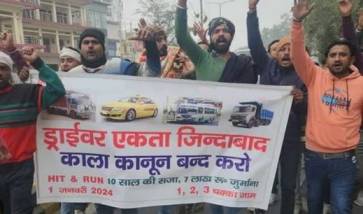Striking fear: On hit-and-run accident cases and Section 106 of the Bharatiya Nyaya Sanhita
Drivers’ strike is a test for severity of hit-and-run clause in new penal code
The provision in the Bharatiya Nyaya Sanhita (BNS) that treats hit-and-run accident cases as an aggravated form of the offence of causing death by rashness or negligence will be the first in the new, yet-to-be implemented code to be scrutinised for its severity. With truck drivers worried about the implications of Section 106 of the BNS abstaining from work, the government has promised to bring it into play only after consultations with the All India Motor Transport Congress. However, with the transporters’ body taking the stand that the strike was primarily resorted to by the drivers who feared additional criminal liability , the issue will require tactful handling. It has now become an issue that concerns transport workers than those running the business of transportation. It may appear that a strike against a law that makes penal provisions concerning hit-and-run accidents more stringent is unjustified, especially in the context of road accidents becoming a leading source of fatalities in the country. However, it has also drawn attention to the question whether there was a case for increasing the jail term for accidents from two to five years in all cases, and to 10, in the case of failure to report them to the authorities.
Section 106 of the BNS will replace Section 304A of the IPC, which punished the causing of death by rash and negligent act that does not amount to culpable homicide . The existing section provides for a two-year jail term. There are three components to Section 106: first, it prescribes a prison term of up to five years, besides a fine, for causing death due to rash or negligent acts; second, it provides for reduced criminal liability for registered medical doctors of two years in jail, if death occurred in the course of a medical procedure. The second clause concerns road accidents in which, if the person involved in rash and negligent driving “escapes without reporting it to a police officer or a Magistrate soon after the incident”, the imprisonment may extend to 10 years and a fine. Drivers flee an accident scene out of fear of lynching . In such cases, the authorities seem to believe that such drivers can move away from the scene of crime and then report to the police. The term ‘hit-and-run’ is one in which the offending vehicle is not identified. It must be emphasised that once the person causing a fatal accident is identified, the onus on the police to prove culpability for rashness or negligence remains the same. Given that many accidents are caused due to poor road conditions too, a relevant question is whether the law should focus on raising prison terms or on a comprehensive accident prevention policy package covering imprisonment, compensation and safety.
